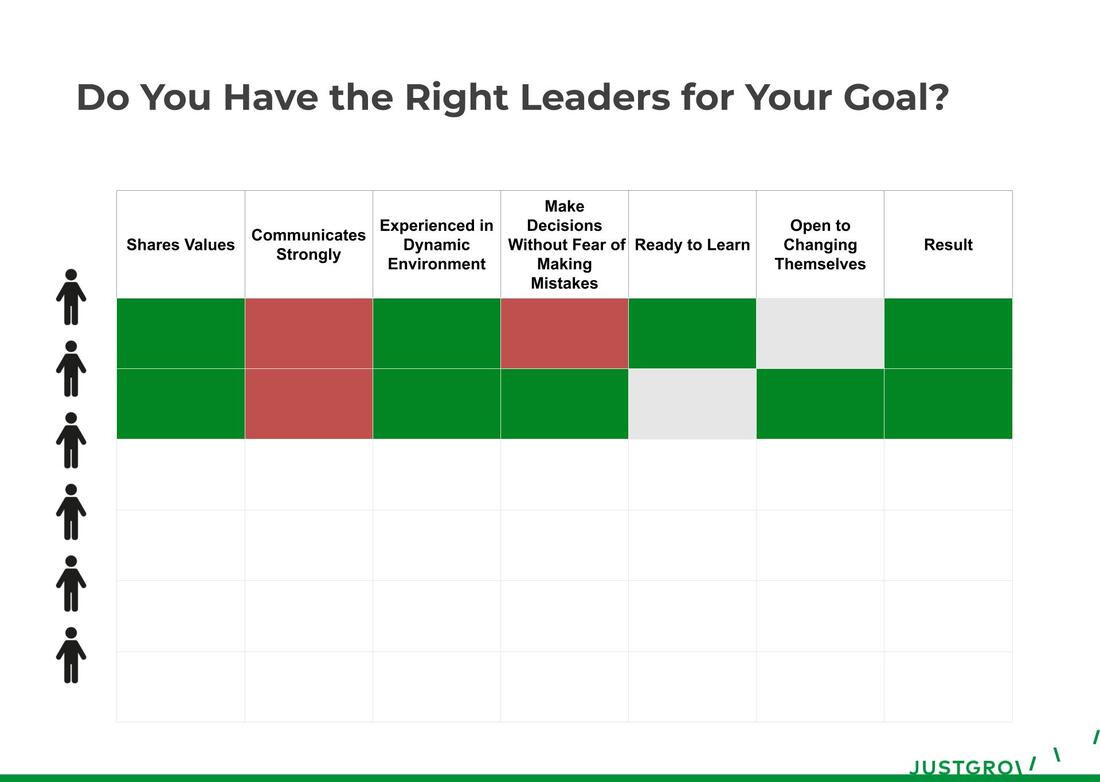|
If there is a problem in the growth of a company, it may be due to the filling of important key positions. A problem that is often overlooked. Who likes to admit that their loyal colleagues in their management team are not the right ones for a position? If you also have a personal relationship with each other, that doesn't make it any easier. The fact is: the longer you let such bad appointments go on, the longer your company will run with the handbrake on. Keep – develop – let go How do you find out which of your managers are particularly helpful to you, which you should develop, and which are hindering rather than helping your company's growth goals? I sit down with my clients and together we evaluate each individual in their leadership team. These seven questions will help: Six questions to evaluate your managers
A simple matrix has proven successful for evaluating management teams. They define the central criteria that an optimal manager should fulfill in their role. These can be the criteria from the seven questions, but also others that are suitable for your company. Then evaluate each manager individually according to strong (green), weak (red) and neutral (gray). You can also assign points and then add them up. You rate strengths with 1, weaknesses with -1 and neutral characteristics with 0. This gives you a nice graphical representation of how the desired leadership skills are distributed in your leadership team, where there is development potential and where you should perhaps also critically question whether a person really fits into your leadership team. You can find a template of this evaluation matrix here . This way you can measure and track the development of your managers.
An effective tool for quickly and sustainably increasing the performance of your managers is the Manager Feedback Survey from Google . Managers are evaluated by their employees every three months based on 13 leadership traits that Google has identified as key through studies. The answers range from one to five – strongly disagree to completely agree. Not only can you quickly and reliably determine the development needs of individual managers, you also have a tool to track the actual development curve of the managers over the course of the year. Each manager picks a development topic from the survey results that they would like to work on and discusses this topic with their team. This creates commitment and increases the chances of success. Google Manager Feedback Survey
How to find and hire the right managers. Maybe you had to part ways with a few managers and are now looking for suitable successors. Or you have additional need for managers thanks to your company's growth. No matter what scenario you find yourself in, you want to ensure that the new leaders will move your company forward and make it better. How can you find out whether candidates will not only perform in the interviews, but also be successful in their jobs later on? In his bestseller “Work Rules!” Ex-Google CHRO Laszlo Bock describes which hiring methods are particularly meaningful with regard to later performance in the job - and which are more like a game of chance. The most important tip in advance: When recruiting for executives, don't just use one instrument, but combine several instruments with each other - ideally ones that very reliably predict the future performance of your candidates. According to extensive Google analysis, the most reliable methods for predicting the subsequent performance of candidates are, in % probability:
Ask for work samples. Give your applicants a task to solve that they would also find in their future position. Then evaluate your candidates’ performance together in a personal conversation. Test general cognitive abilities. This method is a good indicator of people's later performance because general cognitive abilities also include the ability to learn. This combination of intelligence and learning ability is what makes people successful in their jobs. This makes these tests particularly meaningful. Conduct structured interviews. In structured interviews, job interviews follow a predetermined schedule. The questions are of course tailored to your job profile. This way you can test competencies that are important for the respective position. Use behavioral and situational questions. For behavioral questions, ask applicants to describe previous achievements and compare them to the requirements of the current position (“Tell me about a time when…?”). In situational interviews, you ask questions about hypothetical situations relevant to the open position (“What would you do if…?”). The advantages of structured interviews: You can evaluate candidates particularly objectively and compare them with each other. The disadvantages: Structured interviews do not produce a natural conversation. In addition, the effort required for preparation and follow-up is significantly higher than with unstructured interviews. The US Office of Personnel Management uses structured interviews when hiring and offers a number of free materials . Always make decisions by committee. Don’t let your managers decide who to hire on their own. Create a hiring committee that is as diverse as possible and consists of the applicants' future managers, colleagues and employees. In this way, you prevent unconscious biases from influencing the decision to fill a position. Do reference checks. If you still have doubts about a candidate, call two former superiors or work colleagues and ask them for their opinion. Important: Ask specifically five times about the candidate’s weaknesses. Most people in Canada are simply too polite to tell you the blunt truth right away. Tool tip: 3 providers that can help you choose the right manager are the assessments from Thomas , Topgrading and Hogan . Conclusion Growth is a leadership task. That's why, if your company's growth is stagnating, you should start researching the causes. Why or who is responsible for not achieving your growth goals? The questions from the Google Manager Survey will help you gain clarity. But only if you are mercilessly honest with yourself and in your assessment of your managers. Think carefully about what behavior, what characteristics, what strengths you expect from your managers - in the respective situation in which your company currently finds itself. If you know your expectations and have a clear picture of who on your leadership team is already meeting, partially meeting, or not meeting those expectations, you can make informed decisions about how you want to develop and change your leadership team. https://justgrow.eu/blog/ If you're interested in reading more of Olaf articles please visit the website link above. (Please note that Olaf's site is in German but Google translate does an excellent job of instantly translating it to English.) How can you elevate your people to the next level? To find out what you can improve in your leadership team to grow more easily, quickly and profitability, try our complimentary Agile Growth Checklist. This self-service questionnaire takes 5 to 10 minutes to complete. You'll receive the checklist with your responses immediately. Within 24 hours, you'll receive a compiled report highlighting areas to improve. This report is complementary and involves no obligation. Complete section 1 and 4 to check your leadership team* and accountability processes*. Or complete all 7 sections to find out how your company is doing in each of the 7 areas needed to produce more rapid, profitable and sustainable growth. Comments are closed.
|
Archives
December 2029
Categories
All
|



 RSS Feed
RSS Feed
